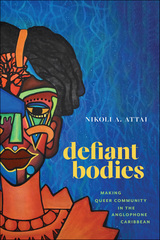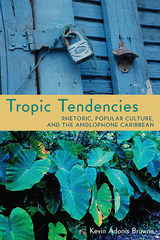2 books about Anglophone Caribbean

Defiant Bodies
Making Queer Community in the Anglophone Caribbean
Nikoli A. Attai
Rutgers University Press, 2023
In the Anglophone Caribbean, international queer human rights activists strategically located within and outside of the region have dominated interventions seeking to address issues affecting people across the region; a trend that is premised on an idea that the Caribbean is extremely homophobic and transphobic, resulting in violence and death for people who defy dominant sexual and gender boundaries. Human rights activists continue to utilize international financial and political resources to influence these interventions and the region’s engagement on issues of homophobia, transphobia, discrimination, and the HIV/AIDS epidemic. This focus, however, elides the deeply complex nature of queerness across different spaces and places, and fails to fully account for the nuances of queer sexual and gender politics and community making across the Caribbean. Defiant Bodies: Making Queer Community in the Anglophone Caribbean problematizes the neocolonial and homoimperial nature of queer human rights activism in in four Anglophone Caribbean nations -- Barbados, Guyana, Jamaica, and Trinidad and Tobago -- and thinks critically about the limits of human rights as a tool for seeking queer liberation. It also offers critical insight into the ways that queer people negotiate, resist, and disrupt homophobia, transphobia, and discrimination by mobilizing “on the ground” and creating transgressive communities within the region.
[more]

Tropic Tendencies
Rhetoric, Popular Culture, and the Anglophone Caribbean
Kevin Adonis Browne
University of Pittsburgh Press, 2013
A legacy of slavery, abolition, colonialism, and class struggle has profoundly impacted the people and culture of the Caribbean. In Tropic Tendencies, Kevin Adonis Browne examines the development of an Anglophone Caribbean rhetorical tradition in response to the struggle to make meaning, maintain identity, negotiate across differences, and thrive in light of historical constraints and the need to participate in contemporary global culture.
Browne bases his study on the concept of the “Caribbean carnivalesque” as the formative ethos driving cultural and rhetorical production in the region and beyond it. He finds that carnivalesque discourse operates as a “continuum of discursive substantiation” that increases the probability of achieving desired outcomes for both the rhetor and the audience. Browne also views the symbolic and material interplay of the masque and its widespread use to amplify efforts of resistance, assertion, and liberation.
Browne analyzes rhetorical modes and strategies in a variety of forms, including music, dance, folklore, performance, sermons, fiction, poetry, photography, and digital media. He introduces chantwells, calypsonians, old talkers, jamettes, stickfighters, badjohns, and others as exemplary purveyors of Caribbean rhetoric and deconstructs their rhetorical displays. From novels by Earl Lovelace, he also extracts thematic references to kalinda, limbo, and dragon dances that demonstrate the author’s claim of an active vernacular sensibility. He then investigates the re-creation and reinvention of the carnivalesque in cyber culture, demonstrating the ways participants both flaunt and defy normative ideas of “Caribbeanness” in online and macro environments.
Browne bases his study on the concept of the “Caribbean carnivalesque” as the formative ethos driving cultural and rhetorical production in the region and beyond it. He finds that carnivalesque discourse operates as a “continuum of discursive substantiation” that increases the probability of achieving desired outcomes for both the rhetor and the audience. Browne also views the symbolic and material interplay of the masque and its widespread use to amplify efforts of resistance, assertion, and liberation.
Browne analyzes rhetorical modes and strategies in a variety of forms, including music, dance, folklore, performance, sermons, fiction, poetry, photography, and digital media. He introduces chantwells, calypsonians, old talkers, jamettes, stickfighters, badjohns, and others as exemplary purveyors of Caribbean rhetoric and deconstructs their rhetorical displays. From novels by Earl Lovelace, he also extracts thematic references to kalinda, limbo, and dragon dances that demonstrate the author’s claim of an active vernacular sensibility. He then investigates the re-creation and reinvention of the carnivalesque in cyber culture, demonstrating the ways participants both flaunt and defy normative ideas of “Caribbeanness” in online and macro environments.
[more]
READERS
Browse our collection.
PUBLISHERS
See BiblioVault's publisher services.
STUDENT SERVICES
Files for college accessibility offices.
UChicago Accessibility Resources
home | accessibility | search | about | contact us
BiblioVault ® 2001 - 2024
The University of Chicago Press









